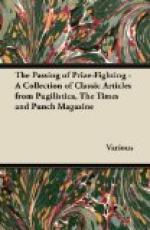But perhaps that is unnecessary now. I think that by this time I have made it clear just how many stars I possess.
One on the right shoulder. So:
*
And one on the left shoulder. So:
*
That is all.
A.A.M.
* * * * *
THE FOUNTAIN.
Upon the terrace where I play
A little fountain sings all day
A
tiny tune:
It leaps and prances in the air—
I saw a little fairy there
This
afternoon.
The jumping fountain never stops—
He sat upon the highest drops
And
bobbed about.
His legs were waving in the sun,
He seemed to think it splendid fun,
I
heard him shout.
The sparrows watched him from a tree,
A robin bustled up to see
Along
the path:
I thought my wishing-bone would break,
I wished so much that I could take
A
fairy bath.
R.F.
* * * * *
“LIBRARY NOTES.
“Mr. Buttling Sees It
Thru, H.G. Wells.”
—Citronelle
Call (Alabama, U.S.A.).
Rumours that Mr. WELLS is a convert to the “nu speling” may now be safely contradicted.
* * * * *
[Illustration: “KEEP THE HOME FIRES BURNING.”
SOLO BY OUR OPTIMISTIC PREMIER.]
* * * * *
THE MUD LARKS.
I am living at present in one of those villages in which the retreating Hun has left no stone unturned. With characteristic thoroughness he fired it first, then blew it up, and has been shelling it ever since. What with one thing and another, it is in an advanced state of dilapidation; in fact, if it were not that one has the map’s word for it, and a notice perched on a heap of brick-dust saying that the Town Major may be found within, the casual wayfarer might imagine himself in the Sahara, Kalahari, or the south end of Kingsway.
Some of these French towns are very difficult to recognise as such; only the trained detective can do it. A certain Irish Regiment was presented with the job of capturing one. The scheme was roughly this. They were to climb the parapet at 5.25 A.M. and rush a quarry some one hundred yards distant. After half-an-hour’s breather they were to go on to some machine-gun emplacements, dispose of these, wait a further twenty minutes, and then take the town. Distance barely one thousand yards in all. Promptly at zero the whole field spilled over the bags, as the field spills over the big double at Punchestown, paused at the quarry only long enough to change feet on the top, and charged yelling at the machine guns. Then being still full of fun and joie de vivre, and having no officers left to hamper their fine flowing style, they ducked through their own barrage and raced all out for the final objective. Twenty minutes later, two miles further on, one perspiring private turned to his panting chum, “For the love of God, Mike, aren’t we getting in the near of this damn town yet?”




